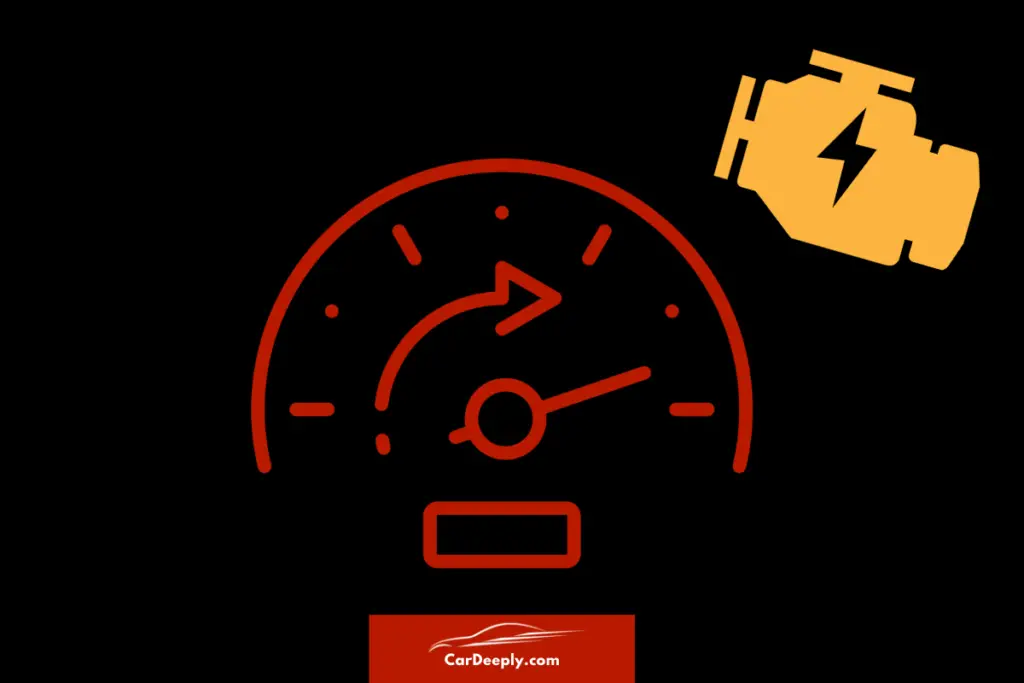Ever found yourself in a panic as your check engine light starts flashing when you’re accelerating?
This could be a sign of a serious issue that might lead to costly repairs if ignored.
In this article, you’ll discover:
- The common causes of this problem
- Practical tips to troubleshoot
- Effective fixes to apply
With this knowledge, you can tackle this issue and save yourself from a hefty repair bill. So, buckle up, and let’s dive into the heart of the matter!
Advertising links are marked with *. We receive a small commission on sales, nothing changes for you.
Key Takeaways

- The check engine light is a crucial warning system in your car.
- Flashing the check engine light when accelerating can indicate serious issues.
- Causes range from engine misfires to faulty sensors and ignition problems.
- Diagnostic tools can help identify the cause of the problem.
- Regular maintenance and timely repairs can prevent this issue.
Understanding the Check Engine Light
Now that we’ve got a handle on the check engine light let’s dive into the common causes that might make it flash when you’re hitting the gas. Understanding these can help you troubleshoot effectively.
What is the Check Engine Light?
Have you ever noticed that little engine icon on your car’s dashboard?
That’s your check engine light.
It’s like a messenger telling you something’s not right under the hood. It’s a key part of your car’s onboard diagnostic system and should not be ignored.
Importance of the Check Engine Light
The check engine light is your car’s way of communicating with you. It warns that your vehicle’s engine or related systems might be off. Ignoring it could lead to serious damage and hefty repair bills.
So, when it lights up, it’s time to pay attention.
- Prevents damage: It alerts you to issues before they become major problems.
- Saves money: Catching issues early can save you from costly repairs.
- Keeps you safe: Some difficulties could be safety hazards if left unchecked.
How the Check Engine Light Works
Your car is smart. It has a bunch of sensors and systems constantly monitoring various parts of the engine.
When one of these sensors detects something unusual, it sends a signal to your car’s computer system. This triggers the check engine light to flash or stay lit on your dashboard.
But here’s the kicker: the check engine light doesn’t tell you exactly what’s wrong. It’s like a general alarm, alerting you that something needs your attention. It could be a minor issue like a loose gas cap or something serious like a misfiring engine.
That’s why it’s crucial to investigate further when you see your check engine light flashing, especially when accelerating.
Causes of Check Engine Light Flashing When Accelerating
Now that we’ve got a handle on the check engine light, let’s dive into the common causes that might make it flash when you’re hitting the gas.
Understanding these can help you troubleshoot effectively.
Engine Misfire
First on our list is the engine misfire. Picture this: you’re cruising down the road, and suddenly your car starts to feel like it’s sputtering or jerking. That’s a classic sign of an engine misfire. It means one or more of your engine’s cylinders aren’t firing properly.
This can cause your check engine light to flash, especially when stepping on the gas.
Faulty Oxygen Sensor
Next up, we’ve got the oxygen sensor. This little device measures oxygen in your car’s exhaust gases. It’s crucial for controlling your engine’s fuel mixture. If fixed, your motor may burn more fuel than necessary, leading to better fuel economy and increased emissions. And yes, accelerating can cause your check engine light to flash.
Bad Spark Plugs
Spark plugs are like the heart of your engine. They ignite the fuel-air mixture in your engine’s cylinders, causing the combustion that powers your car. But they can’t do their job properly when they’re worn out or damaged.
This can lead to various problems, including a flashing check engine light.
Engine Overheating
Your engine likes to stay cool like you on a hot summer day. But when it gets too hot, it can cause serious damage. That’s why your car has a cooling system to check the engine’s temperature. But if something goes wrong with this system, your engine can overheat.
This can trigger the check engine light to flash, particularly when accelerating.
Faulty Engine Control Unit
Think of the Engine Control Unit (ECU) as your car’s brain. It controls various aspects of your engine’s operation, using data from sensors throughout your vehicle. If it’s not working properly, it can cause many issues, including a flashing check engine light.
Issues with Camshaft Sensor
The camshaft sensor plays a crucial role in your engine’s ignition system. It tells the ECU when to fire the spark plugs. If it needs to be fixed, it can mess up the timing of your engine’s combustion process.
This can cause your check engine light to flash when you’re accelerating.
Problems with the Fuel Delivery System
Your engine needs just the right amount of fuel to run smoothly. That’s where the fuel delivery system comes in. It ensures your engine gets the fuel it needs when it needs it. But if this system has a problem, it can cause your engine to run lean (not enough fuel) or rich (too much fuel).
Either of these conditions can trigger the check engine light to flash.
Vacuum Leak
Your engine uses a vacuum to control various things, like air intake into the engine and fuel flow. A leak in the vacuum system can cause your engine to run poorly and trigger the check engine light.
Ignition Problem
Last but not least, we have ignition problems. These can range from issues with the ignition coil to problems with the ignition switch. A problem with any part of the ignition system can cause your check engine light to flash, especially when accelerating.
Solutions and Prevention
Using a Diagnostic Tool
Have you got a flashing check engine light? Don’t panic. A diagnostic tool can be your best friend in this situation. It’s a device that connects to your car’s computer system and reads trouble codes. These codes can give you a clue about what’s causing the problem.
It’s like a translator, helping you understand what your car tries to tell you.
Replacing Faulty Components
Once you’ve identified the problem, it’s time to take action. This might involve replacing faulty components. For instance, replacing your spark plugs could solve the problem if they are worn out. Or if your oxygen sensor is defective, a new one might be just what your car needs.
Remember, it’s always best to consult a professional before repairing yourself.
Regular Maintenance and Check-ups
Prevention is better than cure. Regular maintenance can help you avoid issues that cause your check engine light to flash. This includes things like:
- Changing your oil regularly
- Replacing filters as needed
- Checking your spark plugs
- Keeping an eye on your car’s coolant level
When to Consult a Mechanic
Sometimes, despite your best efforts, you should call in the pros. If you’re unsure what’s causing your check engine light to flash, or if you’ve tried fixing it and the problem persists, it’s time to consult a mechanic. They have the knowledge and tools to diagnose and cure the issue.
Frequently Asked Questions
What does it mean if the check engine light flashes and stops?
If your check engine light flashes and then stops, it’s still a cause for concern. It could mean that there’s an intermittent issue that’s only occurring under certain conditions. It’s best to use a diagnostic tool to read the trouble codes and understand what might be causing this.
Can I drive my car if the check engine light is flashing when accelerating?
While your car might still be drivable, ignoring a flashing check engine light is not advisable. This is usually a sign of a serious issue that could lead to damage if not addressed. Getting your car checked out as soon as possible is best to prevent further problems.
How long does the check engine light take to reset after the issue is fixed?
After the issue causing the check engine light to flash is fixed, the light should go off immediately. However, sometimes, it might take a few driving cycles (starting, driving, and stopping your car) for the light to reset.
Can regular maintenance prevent my check engine light from flashing when accelerating?
Regular maintenance can prevent many issues that cause your check engine light to flash. This includes regularly changing your oil, replacing worn-out spark plugs, and ensuring your fuel delivery system works properly.
Can a faulty battery cause the check engine light to flash when accelerating?
While a faulty battery might not cause the check engine light to flash, it can lead to other issues that trigger the light. For instance, if your battery doesn’t provide enough power, it could affect your car’s ignition or fuel delivery system.
Conclusion
A flashing check engine light when accelerating can be scary. But with the right knowledge and tools, you can tackle this issue head-on. Remember, your car is trying to tell you something.
So, please don’t ignore it. Listen to it, understand it, and take action.

Sebastian loves convertibles and drove a BMW 335i for a long time (325 hp is just a dream). Today, with two children, he is more concerned with SUVs and family-friendly vehicles. In addition to an Audi A4 Avant, he also drives a Cupra Formentor VZ – even as a family man, you can’t do without speed. Get to know Sebastian better and visit the About Us page.
Advertising links are marked with *. We receive a small commission on sales, nothing changes for you.
